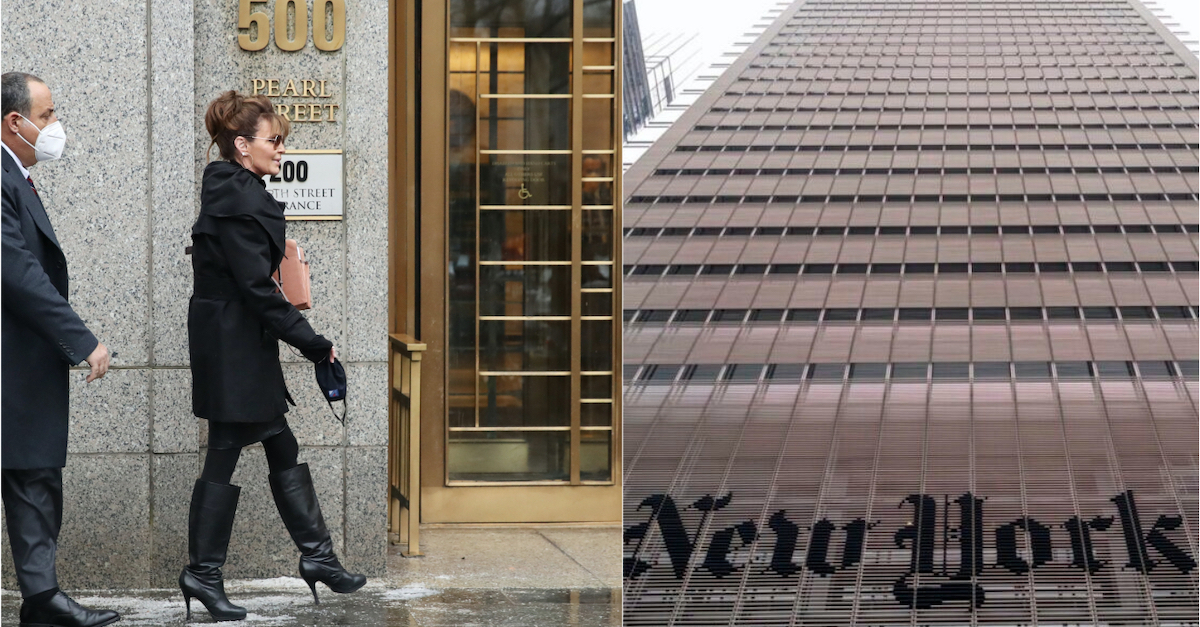
On the left, ex-Alaska Gov. Sarah Palin (R) enters into a Manhattan federal courthouse at 500 Pearl Street, where her lawsuit against the New York Times is taking place. The newspaper’s headquarters is on the right.
One week after a federal judge disclosed that “several” jurors learned that he dismissed the case during deliberations, attorneys for former Alaska Gov. Sarah Palin (R) asked to set aside their verdict finding the New York Times not liable for defamation and retry the case. They also want to disqualify the judge in a slew of five post-trial motions.
Senior U.S. District Judge Jed Rakoff dubbed the legal blitz Palin’s team proffered “interesting.”
“The first was a motion to disqualify me and to disqualify me retroactively,” Rakoff remarked nonchalantly.
Palin’s lawyers also want to interview jurors amid reports that they informed the court that they received push notifications on their phones that Rakoff dismissed the defamation suit one day before the not-liable verdict. The former governor and onetime vice-presidential candidate asked to set aside that verdict, requested reconsideration of Rakoff’s earlier ruling dismissing the case, and sought an accounting of Rakoff’s interactions with the media during trial.
Rakoff replied that he had “zero” interactions with the press during the trial. There were “none whatsoever,” he emphasized.
The judge acknowledged that he did respond to a press inquiry from Bloomberg News about post-trial reports that jurors learned of his ruling via push alerts, but he said he did not engage with the media during the trial. He invited Palin’s team to file such a motion regardless if that answer did not satisfy them.
Palin’s lawyers asked to submit a 50-page brief advancing their arguments, a request that Rakoff granted before abruptly ending a roughly 15-minute hearing.
Legal experts questioned the timing of Rakoff’s Valentine’s Day ruling, which found that no reasonable jury could have found actual malice in the Times editorial erroneously linking Palin to Jared Lee Loughner’s mass shooting. The jury agreed the next day that the quickly corrected editorial did not defame Palin.
Titled “America’s Lethal Politics,” the 2017 editorial noted that Palin’s political action committee Sarah PAC circulated a map with crosshairs over the electoral district of Arizona Rep. Gabrielle Giffords and 19 other Democrats. The original version went further to claim “the link to political incitement was clear”—an assertion stricken some 12 hours later. No link was ever established between the map and Loughner’s shooting.
Even though the error was widely acknowledged throughout the news industry as a bad one, most legal experts agreed that Palin’s case was a weak one. Under the standard established by the Supreme Court case of New York Times v. Sullivan, Palin needed to prove not only that the editorial was erroneous but that author James Bennet wrote the disputed words with actual malice. That could only have been established if a jury found through clear and convincing evidence that he knew the claim was likely to be wrong and published it anyway with reckless disregard for the truth.
Internal Times communications showed that Bennet deleted the offending passage the morning after fellow editorial writer Ross Douthat informed him of the error. When Palin took the stand, she provided little sworn testimony or evidence to establish that the editorial damaged her in any way, either financially, emotionally, or in terms of her reputation.
(Photo of Palin via Spencer Platt/Getty Images; photo of NYT building via JOHANNES EISELE/AFP via Getty Images)